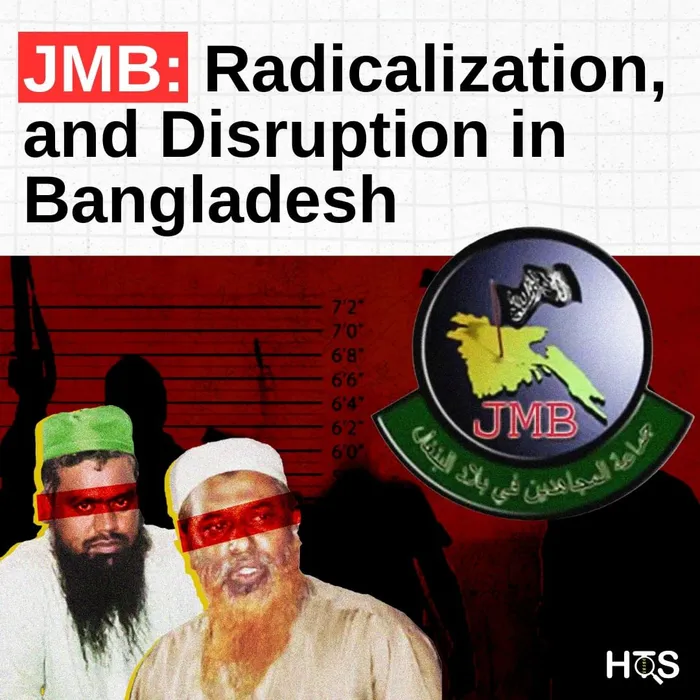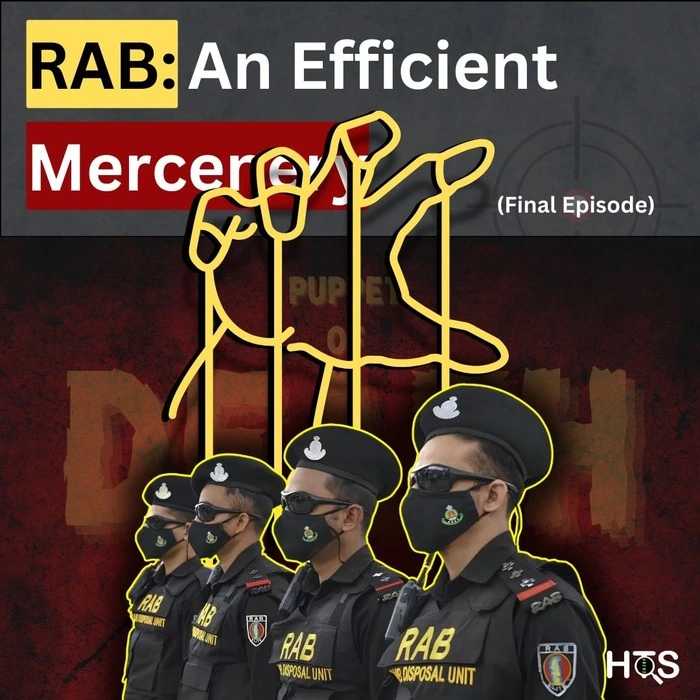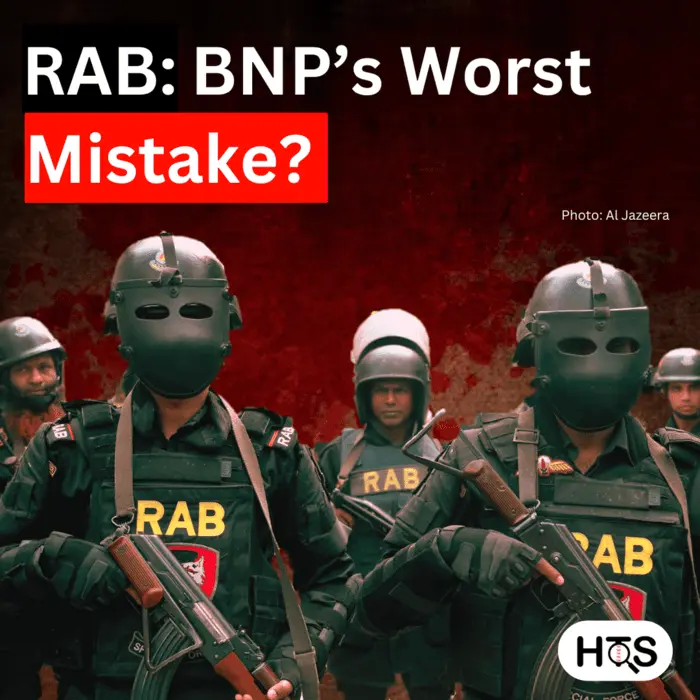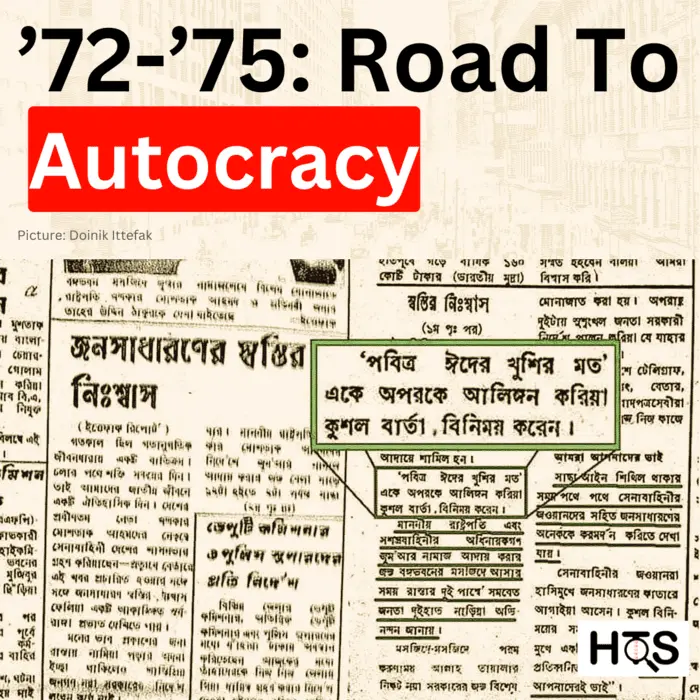JMB: Radicalization and Disruption in Bangladesh

Emerging in the late 1990s, Jamaat-ul-Mujahideen Bangladesh (JMB) is a militant Islamist group aiming at creating an Islamic state under Sharia law in Bangladesh. The group gained notoriety for its planned bomb strikes across Bangladesh in 2005, which declared its operational capacity and intention to impose its extreme beliefs. JMB has used violence to target citizens, government officials, and institutions that oppose its beliefs.
Formation and Ideology
JMB was officially formed in 1998 in the Jamalpur district, though its exact origins are somewhat murky. It is believed to have been established as a youth front for the already existing militant group, Al Mujahideen. It was founded by Shaikh Abdur Rahman, an Islamic cleric educated in Saudi Arabia, who returned to Bangladesh with a vision of establishing a Sharia-based state. Rahman was heavily influenced by the global jihadist movements and believed that the only way to purify society was through armed struggle against secular institutions. JMB’s ideology was rooted in a strict interpretation of Islam, rejecting the democratic and secular principles upon which Bangladesh was founded. The group initially operated in secrecy, focusing on recruiting members, spreading its ideology, and establishing a network of cells throughout the country. The group also aimed to “free Muslims” from the influence of practices that they viewed as anti-Islamic, particularly those involving women’s participation in public life.
Key Attacks and Operations
- 2003 Dinajpur Bombings (Bangladesh):
JMB carried out bomb explosions in Dinajpur, injuring several people. It was one of the group’s early violent acts that brought them into the public eye. - August 17, 2005, Nationwide Bombings (Bangladesh):
JMB conducted over 500 simultaneous bomb blasts in 63 out of 64 districts of Bangladesh. The coordinated attack was a demonstration of the group’s organisational strength and its intent to enforce Sharia law across the country. -
November 14, 2005, Assassination of Judges (Bangladesh):
Two judges, Sohel Ahmed and Jagannath Pandey, were assassinated by JMB operatives in Jhalakathi as part of the group’s campaign against the judiciary. - 2006 Foiled Dhaka Bombing Plot (Bangladesh):
A significant bombing at a public event in Dhaka was averted when security forces arrested key JMB operatives before they could execute the plan. - 2014 Burdwan Blast (West Bengal, India):
An explosion in Burdwan, West Bengal, at a JMB bomb-making facility revealed the group’s operations in India, leading to several arrests and the uncovering of network planning attacks in both Bangladesh and India. - 2015 Planned New Year’s Eve Attack (Foiled, Bangladesh):
JMB planned to attack New Year’s Eve celebrations in Dhaka, but the timely intervention of security forces foiled the plot. - 2016 Dhaka Café Attack (Bangladesh):
The Holey Artisan Bakery attack in Dhaka, which resulted in the deaths of 22 people, included perpetrators with connections to JMB, although ISIS primarily claimed it. - 2018 Bodh Gaya Bombing (Bihar, India):
JMB was implicated in the planting of bombs at the Mahabodhi Temple complex, a significant Buddhist pilgrimage site. The bombs did not cause casualties. - 2019 Kolkata Durga Puja Bombing Plot (Foiled, India):
Indian authorities foiled a JMB plot to carry out bombings in Kolkata during the Durga Puja festival, one of the most significant Hindu festivals in India.
Minor and Foiled Attacks
- 2002 Parbatipur Incident (Bangladesh):
JMB first came to public attention when eight militants were arrested in Parbatipur, Dinajpur, with 25 petrol bombs and incriminating documents. This event marked the beginning of their public operations. - 2010 Rajib Karim Case (United Kingdom):
Rajib Karim, a JMB operative working as an IT specialist at British Airways, was arrested and convicted for plotting with al-Qaeda to execute terrorist attacks, including an attempt to smuggle a bomb onto a U.S.-bound flight. - September 2010 Arrest of Faruk Ahmed Aruj (Germany):
Faruk Ahmed Aruj, a German expatriate of Bangladeshi origin, was arrested in Jhenaidah, Bangladesh, for his alleged involvement with JMB. He had been living in Germany for two decades and was linked to jihadist activities in Europe. - 2015 Fake Currency Operation (India and Bangladesh):
JMB was involved in smuggling counterfeit Indian currency into West Bengal and Assam, India, with alleged involvement from Pakistani diplomats. Indian and Bangladeshi authoritiesdiscovered and disrupted this operation. - Ongoing Operations in West Bengal (India):
Over the years, JMB has established a strong presence in West Bengal, focusing on recruitment and logistical support for cross-border terrorism. The group has been involved in several small-scale operations and plots, many of which have been thwarted by Indian security forces.
The Landmark Terror Event of JMB
The August 17, 2005, Nationwide Bombings orchestrated by JMB stand as one of the most extensive and coordinated terrorist attacks in Bangladesh’s history. The scale and execution of the bombings were unprecedented, marking a significant moment in the country’s battle against extremism.
JMB, under the leadership of Shaikh Abdur Rahman and Siddiqul Islam (also known as Bangla Bhai), meticulously planned this operation to showcase their organisational strength and ideological commitment to establishing an Islamic state governed by Sharia law. The group’s motivation stemmed from their radical Islamist views, which opposed the secular government and sought to enforce a strict interpretation of Islamic law across the country.
On the morning of August 17, 2005, JMB operatives detonated over 500 bombs almost simultaneously in 63 out of Bangladesh’s 64 districts, excluding only the remote district of Munshiganj. The bombs were placed in strategic locations, including government buildings, courts, markets, bus stops, and other public areas. Each device was relatively low in intensity, but the widespread nature of the bombings created mass panic across the nation.
The bombs were timed to explode within a 30-minute window, starting around 11:30 AM. The attack was not aimed at causing mass casualties but was intended to send a strong message to the government and the public about JMB’s capabilities. Despite the large number of explosions, the bombings resulted in two deaths and more than 100 injuries. This low casualty rate was partly due to the bombs being less powerful, as the primary goal was to instil fear rather than to cause mass destruction.
In addition to the bombs, JMB operatives left behind leaflets written in Bangla and Arabic, which declared their intent to impose Sharia law and warned the government against persecuting Muslims or attempting to arrest those advocating for Islamic law. The leaflets identified the group as “the soldiers of Allah”. They issued a stark warning to Western powers, particularly the United States and the United Kingdom, to leave Muslim lands or face consequences.
The Aftermath
The August 17, 2005, bombings in Bangladesh had significant consequences for the then-government led by Prime Minister Khaleda Zia and her Bangladesh Nationalist Party (BNP). The attacks occurred during a diplomatic visit to China, where the two nations were expected to sign a significant textile deal valued at approximately one billion US dollars. The bombings forced Zia to cancel the visit and damage the international perception of Bangladesh as a stable investment environment.
The bombings also undermined the credibility of the BNP-led government, as the attacks occurred while the BNP was in a coalition with Jamaat-e-Islami, an Islamist political party. This association with Jamaat-e-Islami, linked to extremist elements, fueled allegations that the BNP was indirectly supporting militant activities, leading to a significant erosion of public trust.
The opposition, particularly the Awami League, capitalised on these allegations and used the incident to portray the BNP as soft on terrorism, which helped them gain political ground. This shift in public perception was vital to the subsequent political success of the Awami League.
Internationally, the bombings drew attention to the rising threat of Islamist extremism in Bangladesh, giving India greater influence in Bangladesh’s internal affairs. The bombings provided India with the rationale to push for closer security cooperation with Bangladesh and advocate for regional security measures, aligning with the interests of the Awami League, which traditionally had closer ties with India compared to the BNP.
The Capture of Shaikh Abdur Rahman
The Rapid Action Battalion (RAB) conducted an in March 2006 to capture Shaikh Abdur Rahman, the leader of JMB. This mission culminated in months of intelligence work, which involved tracking Rahman’s movements and monitoring his communications. Rahman, who had been eluding capture by frequently changing locations, was eventually tracked to a two-story hideout in the East Shaplabagh area of Sylhet.
On March 2, 2006, RAB launched a pre-dawn raid on Rahman’s hideout, surrounding the building and cutting off all potential escape routes. The operation was meticulously planned to minimise casualties, and nearby residents were evacuated to ensure their safety. The raid led to a tense 30-hour standoff, during which RAB officials attempted to negotiate Rahman’s surrender. Rahman, along with a few of his close associates, was heavily armed and initially refused to surrender, likely hoping for an opportunity to escape or to negotiate better terms.
The standoff was marked by psychological warfare, with RAB applying pressure on Rahman by isolating him completely and assuring him of fair treatment if he surrendered peacefully. Rahman eventually realised that he had no viable escape, and, concerned for the safety of his family members who were with him, he chose to surrender. He emerged from the hideout with a white flag and was immediately taken into custody by RAB, along with other militants who were with him.
Rahman’s capture was a significant blow to JMB. As the group’s founder and ideological leader, his arrest provided RAB and other security agencies with invaluable intelligence, which led to subsequent arrests and operations against the remaining JMB network. This operation severely disrupted JMB’s leadership structure and marked the beginning of the group’s decline in operational capabilities.
In 2006, Mirza Azam, an Awami League politician and the Organizing Secretary who won the Jamalpur-3 constituency for the seventh time in a row, criticised the arrest of JMB leader Shaikh Abdur Rahman. He labelled the arrest a staged drama orchestrated by the BNP-Jamaat government, suggesting it was timed to coincide with U.S. President George W. Bush’s visit to India. Although Rahman was his brother-in-law, Azam tried to clarify that they had severed family ties long ago, distancing himself from any association.
Following his capture, Shaikh Abdur Rahman was put on trial and, in 2007, was executed along with other top JMB leaders, including Siddiqul Islam, also known as Bangla Bhai. Their execution was a critical moment in Bangladesh’s counter-terrorism efforts, sending a clear message to other militant groups operating in the country.
Suppression and Decline of JMB
A major chapter in Bangladesh’s counter-terrorism initiatives is the repression and fallout around Jamaat-ul-Mujahideen Bangladesh (JMB). De-radicalizing initiatives, financial upheaval, official enforcement, and community outreach are part of the government’s all-encompassing plan that has been vital in destroying an organisation as solid and ubiquitous as JMB. Following the capture and killing of JMB’s key commanders, Shaikh Abdur Rahman and Siddiqul Islam ( Bangla Bhai), in 2007, the government started its crackdown. This approach comprised nationwide sweeping raids, hundreds of JMB members’ arrests, and shutting off the logistics and support systems allowing JMB’s operations.
The financial disturbance was a major component of the crackdown; the government froze the group’s assets and destroyed its financing sources, including domestic and foreign contributions. This cash crunch reduced JMB’s capacity to obtain firearms, explosives, and other supplies required for its operations.
The deaths of Shaikh Abdur Rahman and Bangla Bhai created a power vacuum inside JMB, therefore aggravating organisational dispersion within the group. The lack of solid leadership resulted in smaller groups with opposing goals and lacking the cohesiveness and strategic direction JMB had possessed. While some breakaway groups tried to carry on under fresh flags or unite with other militant groups, they battled to keep the operational efficiency known for during its height.
To reintegrate former militants into society and stop recidivism, the administration also implemented softer policies aimed at de-radicalization and community engagement, including education and vocational training. Religious leaders and academics were engaged to challenge JMB’s extreme narrative by advancing a more moderate and peaceful version of Islam. Focused on locations where JMB had been most active—especially in rural areas—community engagement initiatives sought to restore confidence between local populations and law enforcement.
Though much has been done to reduce JMB, the group’s menace is not totally eradicated. JMB’s ties to other transnational terrorist groups, like ISIS and Lashkar-e-Taiba (LeT), have sparked questions regarding the group’s ability to reinterpret itself as a component of a more general jihadist network throughout South Asia. Regional security is very much concerned about the likelihood of JMB forming new alliances or rejuvenating old ones, which emphasises the need for continuous collaboration between Bangladesh and her neighbours to fight the menace of Islamist militancy.
Known Missions and Foiled Plots
In addition to the August 17 bombings, JMB was involved in several other attacks and plots, some of which were foiled by law enforcement.
In 2006, the JMB planned a bombing in Dhaka to cause mass casualties and instil fear. The plot was part of a broader strategy to destabilise the government and demonstrate operational capability. However, a successful intelligence operation by the Rapid Action Battalion (RAB) and other security forces foiled the plot. RAB launched raids in Dhaka and surrounding areas, arresting several JMB operatives involved in the attack. The raids also recovered explosives, detonators, and other bomb-making materials. Interrogated operatives provided crucial information that prevented the bombing and led to the discovery of additional JMB cells planning similar attacks.
Several other plots have been foiled by security forces, both in Bangladesh and India. For example, JMB planned attacks on various public and governmental institutions, including courts and law enforcement agencies. In 2016, JMB was linked to the Dhaka café attack, though it was primarily carried out by militants pledging allegiance to ISIS. The involvement of JMB operatives in such an attack highlighted the potential collaboration between domestic extremist groups and international terrorist organisations, raising concerns about the evolving nature of the threat posed by JMB.
In 2019, Indian authorities foiled a central plot by JMB to target densely populated areas in Kolkata during the Durga Puja festival, one of India’s most significant Hindu festivals. The plot, which involved the use of explosives, was uncovered after the arrest of several JMB operatives who had been planning the attacks from their base in West Bengal. This foiled plot was part of a broader investigation that revealed JMB’s efforts to expand its operational footprint in India.
Bangladeshi authorities have made concerted efforts to dismantle JMB’s remaining cells in recent years. Continuous surveillance, intelligence operations, and community outreach programs have helped neutralise many of JMB’s activities. Key leaders have been captured or killed, and the organisation has been significantly weakened. However, the threat of JMB reconstituting itself under a different name or aligning with other militant groups remains a concern. The government has also worked on deradicalisation programs to prevent recruiting new members into such extremist groups.
The Jamaat-ul-Mujahideen Bangladesh (JMB) has been a persistent threat to the nation, with its ability to adapt, evolve, and extend its reach beyond Bangladesh’s borders, highlighting the complex and ongoing battle against terrorism. The group’s influence extends beyond the initial belief, with numerous attacks and foiled plots resulting in significant loss of life. JMB’s involvement in transnational activities, such as smuggling fake currency, plotting attacks in India, and influencing individuals in Europe, underscores the global nature of this threat. The arrests of Rajib Karim in the UK and Faruk Ahmed Aruj in Germany serve as reminders that the ideology propagated by JMB knows no borders.
Despite the darkness, there is hope. Security forces in Bangladesh, India, and beyond have saved countless lives and thwarted many of JMB’s plans. The global community’s cooperation and continuous pursuit of justice against those who seek to spread terror have shown that while the fight against extremism is far from over, it is one that can be won.
The story of JMB is not just about the terror they spread. It’s about the resilience of those who stand against them. It’s about the unyielding determination of nations to protect their people and the relentless pursuit of peace in the face of those who wish to destroy it. Vigilance, cooperation, and commitment to justice are the keys to ensuring that groups like JMB never again have the power to threaten our world.
Sources:
- Jamaatul Mujahidin Bangladesh: Weakened, But Not Destroyed | CTC West Point
- Countering Jihadist Militancy in Bangladesh | Crisis Group
- Jama’atul Mujahideen Bangladesh (JMB) | SATP
- The Threat from Jamaat-ul Mujahideen Bangladesh | Crisis Group
- শায়খ ও বাংলাভাইসহ ৬ জঙ্গির ফাঁসি | BDNews24
- Jama’at Mujahideen Bangladesh | nationalsecurity.gov.au
- Bangladesh: Extremism and Terrorism | CounterExtremism Project
- Looking back at Aug 17, 2005 Series Bomb Blasts | The Daily Star
- Bangladesh: Checking Islamist Extremism in a Pivotal Democracy | The Heritage Foundation
- Attacks on the Press in 2005 - Bangladesh | UNHCR
- Mirza Azam terms arrest of Shaekh Rahman as drama | BDNews24



